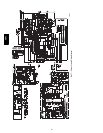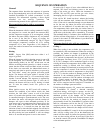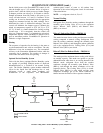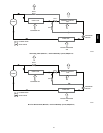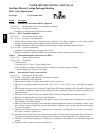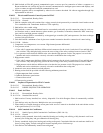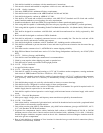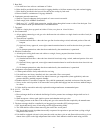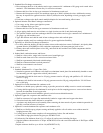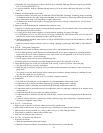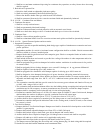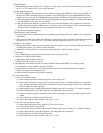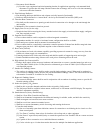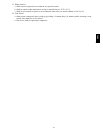
88
3. Standard Heat Exchanger construction
a. Heat exchanger shall be of the tubular--sect ion type constructed of a minimum of 20--gauge steel coated with a
nominal 1.2 mil aluminum--silicone alloy for corrosion resistance.
b. Burners shall be of the in--shot type constructed of aluminum--coated steel.
c. Burners shall incorporate orifices for rated heat output up to 2000 ft (610m) elevation. Additional accessory
kits may be re quired for applications above 2000 ft (610m) elevati on, depending on local gas supply condi-
tions.
d. Each heat exchanger tube shall contain multiple dimples for increased heating effectiveness.
4. Optional Stainless Steel Heat Exchanger construction
a. Use energy saving, direct--spark ignition system.
b. Use a redundant ma in gas valve.
c. Burners shall be of the in--shot type constructed of aluminum--coated steel.
d. All gas piping shall enter the unit cabinet at a single location on side of unit (horizontal plane).
e. The optional stainless steel heat exchanger shall be of the tubular--section type, constructed of a minimum of
20--gauge type 409 stainless steel.
f. Type 409 stainless steel shall be used in heat exchanger tubes and vestibule plate.
g. Complete stainless steel heat exchanger allows for greater application flexibility.
5. Optional Low NO
x
Heat Exchanger construc tion
a. Low NO
x
reduction shall be provide d to reduce nitrous oxide emissions to meet California’s Air Quality Man-
agement District (SCAQMD) low--NO
x
emissions requirement of 40 nanograms per joule or less.
b. Primary tubes and vestibule plates on low NO
x
units shall be 409 stainless steel. Other com ponents shall be
aluminized steel.
6. Induced draft combustion motor and bl ower
a. Shall be a direct--drive, single inlet, forward-- curved centrifugal type.
b. Shall be made from steel with a corrosion --resistant finish.
c. Shall have permanently lubricated sealed bearings.
d. Shall have inherent thermal overload protecti on.
e. Shall have an automatic reset feature.
23 81 19.13.J. Coils
1. Standard Aluminum Fin -- Copper Tube Coils:
a. Standard evaporator and condenser coils shall have aluminum lanced plate fins mechanica lly bonded to seam-
less internally grooved copper tubes with all j oints brazed.
b. Evaporator coils shall be leak tested to 150 psig, pressure tested to 450 psig, and qualified to UL 1995 burst
test at 1775 psig.
c. Condenser coils shall be leak tested to 150 psig, pressure tested to 650 psig, and qualified to UL 1995 burst
test at 1980 psig.
2. Optional Pre--coated aluminum--fin condenser coils:
a. Shall have a durable epoxy--phenolic coating t o provide protection in mildly corrosi ve coastal environments.
b. Coating shall be applied to the aluminum fin stock prior to the fin stamping process to create an inert barrier
betwee n the aluminum fin and copper tube.
c. Epoxy--phenolic barrier shall minimize galvanic action between dissimilar metals.
3. Optional Copper--fin evaporator and condenser coils:
a. Shall be constructed of copper fins mechanically bonded to copper tubes and copper tube sheets.
b. Galvanized steel tube sheets shall not be acceptable.
c. A polymer strip shall prevent coil assembly from contacting the sheet metal coil pan to minimize potential for
galvanic corrosion between coil and pan.
4. Optional E--coated aluminum--fin evaporator and condenser coils:
a. Shall have a flexible epoxy polymer coa ting uniformly applied to all coil surface areas without material
bridging between fins.
b. Coating process shall ensure complete coil encapsulation of tubes, fins and headers.
c. Color shall be high gloss black with gloss per ASTM D523--89.
d. Uniform dry film thickness from 0.8 to 1.2 mil on all surface areas including fin edges.
e. Superior hardness characteristics of 2H per ASTM D3363--92A and cross--hatch adhesion of 4B--5B per ASTM
D3359--93.
f. Impact resistance shall be up to 160 in.--lb (ASTM D2794--93).
580J




